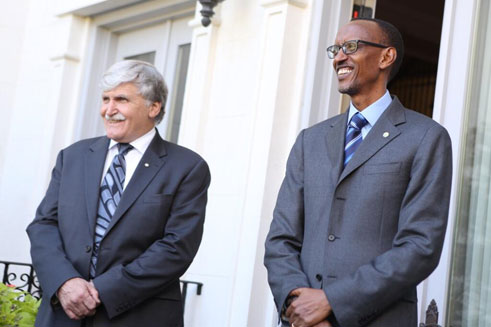Feb 13
20161
Non-Profit Industrial Complex, Whiteness & Aversive Racism, World Wildlife Fund (WWF)
Africa Asia Baka Cameroon United Nations Declaration on the Rights of Indigenous Peoples World Wide Fund for Nature (WWF)
Survival International Accuses WWF of Involvement in Violence and Abuse
February 10, 2016
Survival International has launched a formal complaint about the activities of the World Wide Fund for Nature (WWF) in Cameroon.
This is the first time a conservation organization has been the subject of a complaint to the OECD (Organization for Economic Cooperation and Development), using a procedure more normally invoked against multinational corporations.
The complaint charges WWF with involvement in violent abuse and land theft against Baka “Pygmies” in Cameroon, carried out by anti-poaching squads which it in part funds and equips.
Before beginning its work in Cameroon, WWF failed to consider what impact it would have on the Baka. As a result, WWF has contributed to serious human rights violations and broken the United Nations Declaration on the Rights of Indigenous Peoples. It supports conservation zones on Baka land, to which the Baka are denied access, as well as the anti-poaching squads that have violently abused Baka men and women, and other rainforest tribes, for well over a decade.
The international conservation organization has thereby violated both OECD human rights guidelines and its own policy on indigenous peoples, and Survival’s legal team has therefore submitted a formal complaint.
Baka have repeatedly testified to Survival about the activities of these anti-poaching squads in the region. In 2015 one Baka man said: “When they came to beat me here in my home, my wife and I were sleeping. They beat me with machetes. They beat my wife with machetes.”
The Baka have lived sustainably in the central African rainforest for generations as hunter-gatherers © Selcen Kucukustel/Atlas
“They are letting the elephants die out in the forest at the same time as they are stopping us from eating,” another Baka man told Survival. Today, the destruction of Baka land through logging, mining and the trafficking of wildlife continues, provoking concern among tribespeople that their land is being destroyed, even as they are denied access to large parts of it in the name of conservation.
Survival International is calling for a new approach to conservation that respects tribal peoples’ rights. Tribal peoples have been dependent on and managed their environments for millennia. Despite this, big conservation organizations are partnering with industry and tourism and destroying the best conservationists and guardians of the natural world – tribes. They are the environment’s best allies, and should be at the centre of conservation policy.
Survival’s Director Stephen Corry said today: “WWF knows that the men its supporters fund for conservation work repeatedly abuse, and even torture, the Baka, whose land has been stolen for conservation zones. It hasn’t stopped them, and it treats criticism as something to be countered with yet more public relations. It calls on companies to stick to the same OECD guidelines it routinely violates itself. Both conservation and development have been allowed to trump human rights for decades and millions of people in Africa and Asia have suffered as a result. It’s time the big conservation organizations got their act together. If WWF really can’t stop the guards it funds in Cameroon from attacking Baka, then perhaps it should be asking itself if it has any right to be there at all.”
Watch Baka recount the abuse they suffer at the hands of anti-poaching squads supported by WWF:
Further reading:
WATCH: WWF SILENCE OF THE PANDAS | A Journey into the Heart of the Green Empire


















 Aerial bombing campaigns make U.S. wars for regime change in Afghanistan, Iraq, Libya and Syria highly visible and absolutely undeniable, but the corporate and state press don’t describe U.S. sponsored wars in Africa as such if they talk about them at all. Millions of African people have nevertheless lost their lives or seen their lives destroyed in U.S. sponsored wars for regime change and natural resources in Africa.
Aerial bombing campaigns make U.S. wars for regime change in Afghanistan, Iraq, Libya and Syria highly visible and absolutely undeniable, but the corporate and state press don’t describe U.S. sponsored wars in Africa as such if they talk about them at all. Millions of African people have nevertheless lost their lives or seen their lives destroyed in U.S. sponsored wars for regime change and natural resources in Africa.

































